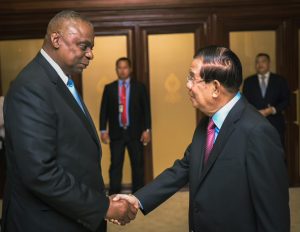U.S. Secretary of Defense Lloyd Austin touched down in Cambodia yesterday for a brief visit in which he met with the new leadership in Phnom Penh in a bid to reverse the recent sharp deterioration in bilateral relations.
During his one-day visit, Austin held meetings with Prime Minister Hun Manet, Defense Minister Tea Seiha, and former Prime Minister Hun Sen, who stepped down last year after nearly four decades in office.
In their meetings, Austin and his interlocutors “discussed opportunities to strengthen the U.S.-Cambodia bilateral defense relationship in support of regional peace and security,” the U.S. Department of Defense said in its official readout. It specifically mentioned the possible “resumption of military training exchanges on disaster assistance and United Nations Peacekeeping, training and exchanges on de-mining and unexploded ordnance clearance, and Cambodia’s access to U.S. Professional Military Education programs.”
In a post on X, Austin wrote, “We had substantive conversations about ways to strengthen U.S.-Cambodian defense ties, and I’m looking forward to further dialogue.”
Austin arrived in Cambodia from Singapore where he attended the annual Shangri-La Dialogue security forum. In a speech to the forum, he spoke of a “new convergence around nearly all aspects of security in the Indo-Pacific” in the face of China’s rising power, but said that war with China was neither “imminent” nor “unavoidable.” His visit also came just days after Cambodia and China wrapped up the biggest-ever iteration of the annual Golden Dragon military exercise.
Over the past decade, China’s growing influence in Cambodia has become a fixation of policymakers in Washington, conjoined with pre-existing concerns about the ruling Cambodian People’s Party (CPP)’s increasingly open authoritarianism. Much of the U.S. concern has focused on Beijing’s role in the extensive works at the Ream Naval Base in the south of the country, which some fear may evolve into a permanent base for the People’s Liberation Army Navy. Cambodian officials have denied the accusations, arguing that the country’s constitution prevents it from allowing any permanent foreign military presence on its territory.
As I noted last week, Austin’s visit to Phnom Penh is an apparent attempt to capitalize on the window of opportunity offered by Hun Manet’s advent to the leadership last August, and to reverse the pattern of mutual recriminations that has sent bilateral defense engagement between the two nations plunge to a generational low.
In 2017, perhaps out of fear that the U.S. might seek to intervene following the 2018 national elections, Cambodia canceled the country’s involvement in Angkor Sentinel, a joint military exercise that the two nations had held annually since 2010, a month after holding for first Golden Dragon exercise with China. Cambodia also demolished two U.S.-built facilities at Ream Naval Base, as part of the China-backed refurbishment.
In 2021, in response to “Cambodia’s curtailment of cooperation in several areas of traditional bilateral military-military engagement,” the U.S. government cut off scholarships for six Cambodian cadets halfway through undergraduate study programs in the United States. U.S. officials also openly criticized Cambodia’s activities at the Ream Naval Base, saying that China’s alleged permanent presence there would “disturb peace and stability in Southeast Asia.”
This disengagement seems not to have done much to discourage Cambodian engagement with China; indeed, it may well have deepened it. Austin’s trip seems to have yielded modest outcomes: in essence, an agreement to begin talking again on issues of mutual interest. Given the sour state of relations over the past decade, this represents progress of a kind. Returning to the previous level of bilateral defense engagement will not loosen Cambodia’s intimate bond with China, which is motivated by more profound concerns about strategic vulnerability and regime security, but in the best-case scenario, it will at least arrest a decline that is arguably neither in Cambodian nor American interests.
































